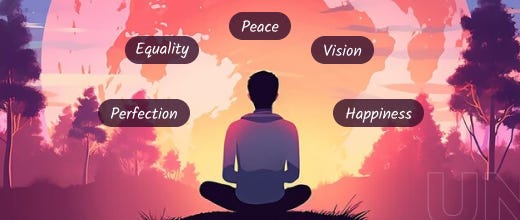The Shadow of Society: A Soul's Awakening to Fear
Elara arrived with the purity of starlight, a perfect human baby, her eyes reflecting the vast, serene cosmic image that was her origin. In her earliest days, before words or concepts could cloud her perception, she was a sentient atom in its purest form, a radiant spark of the universe's benevolent Potential Energy. Her innate quest, the very blueprint of her being, was to understand and to coexist in absolute harmony. She stretched her tiny fingers towards the sun, not in grasping, but in a profound, unconditioned desire to connect with its warmth, to become one with its light.
Her first experiences were a symphony of pure interaction. The soft touch of her mother’s skin was a confirmation of connection, the gentle rhythm of breathing a universal song of life. To Elara, there was no 'other,' only extensions of the same boundless field of being. When her elder brother laughed, a ripple of joy passed through her, an echo of shared vibration. When a flower bloomed, she perceived its intricate beauty as an inherent part of her own unfolding. Her inner world was a mirror of the subtle, balanced cosmic field – a space of infinite potential, where every interaction was a cooperative dance. There was no need for aggression, no hint of scarcity, no understanding of conflict. The universe simply was, and she, a tiny, perfect part of it, coexisted.
The first whisper of discord came subtly, like a faint shadow across her bright perception. It wasn't a sudden, jarring note, but a gradual dissonance introduced by the human culture she was born into. It began with the language she learned, not in its sounds, but in its underlying assumptions. "Mine," her brother was taught to say, staking claim to a toy. Elara felt a peculiar contraction in her chest, a tiny knot forming where there had been only expansion. Why "mine"? Why not "ours," or simply "the toy, available for joy"? The concept of possession, of division, was alien to her intrinsic understanding of interconnectedness.
Then came the subtle judgments. "Good girl," for quiet compliance. "Bad girl," for a spontaneous burst of energy that disrupted an adult's quiet. Elara's innocent actions, born from her natural, harmonious flow, were now being categorized, labeled, and subtly constrained. The universe, which had always responded with balance, was now responding with conditional approval or disapproval. A seed of fear was planted: the fear of not being "good enough," of not meeting an external standard, of being excluded from the very connection she intrinsically sought.
As she grew, the cultural imprints became more pronounced, woven into the fabric of daily life. At school, competition was lauded. "Who is the smartest? Who is the fastest? Who gets the best grades?" Elara, in her soul's quest to know and understand, found herself pushed into a race she hadn't chosen. The joy of learning for its own sake was overshadowed by the fear of failure, the fear of not measuring up to an arbitrary scale. She saw peers ostracizing those who were "different," a direct assault on her innate understanding of coexistence. Why reject a unique variation of the same universal atom? The fear of being "different," of being an outcast, began to gnaw at her.
She observed adults driven by anxiety over "lack"—lack of money, lack of time, lack of status. This fear of scarcity, a stark contrast to the non-depleting, abundant Potential Energy she intuited, became palpable. She felt the tension in their shoulders, the hurriedness in their steps, the worry lines etched on their faces. It transmitted itself, a subtle contagion of apprehension, even though her own inner well of potential felt infinite. The constant media reports of conflict, crime, and natural disaster, presented as the prevailing reality, slowly chipped away at her inherent sense of universal order. Each news headline was a tiny hammer blow against her soul's natural equilibrium.
The biggest fear, the one that truly began to distort her pure being, was the fear of separation. The culture subtly, yet persistently, taught that she was an isolated individual, disconnected from others, and needing to fend for herself in a dangerous, competitive world. Trust became conditional, love seemed fragile, and vulnerability was painted as a weakness. The profound realization of interconnectedness, which was her original state of being, was systematically undermined. When she saw one person deliberately cause another pain, it was not just an act of aggression; it was a profound tearing of the universal fabric she knew to be whole. This witnessing instilled a deep, primal fear of being hurt, of being torn, of existing in a state of disharmony that was utterly alien to her core.
Elara's quest to live in harmony never ceased. It became an internal struggle, a constant push and pull between her soul's inherent knowing and the layers of fear, doubt, and conditional existence that society had imposed. She still yearned for deep connection, still sought understanding that unified rather than divided, still recoiled from injustice. But now, these instincts were often accompanied by an underlying hum of anxiety, a learned caution, a hesitation born of societal wounds. The "inhuman culture," not through malice but through its ingrained patterns of fear, competition, and separation, had taught her to be afraid. The perfect human baby, destined for harmony, now carried the heavy, human burden of conditioned fear, striving constantly to remember the starlight from which she came, and to shed the shadows that had been cast upon her quest. Her goal to create an education system that could restore this original harmony was born directly from this profound, personal experience of the fear that society had inadvertently instilled.


